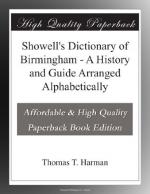Allen, J.—Local portrait painter of some repute from 1802 to 1820.
Aston, John, who died Sept. 12, 1882, in his 82nd year, at one time took a leading share in local affairs. He was High Bailiff in 1841, a J.P. for the county, for 40 years a Governor of the Grammar School, and on the boards of management of a number of religious and charitable institutions. A consistent Churchman, he was one of the original trustees of the “Ten Churches Fund,” one of the earliest works of church extension in Birmingham; he was also the chief promoter of the Church of England Cemetery, and the handsome church of St. Michael, which stands in the Cemetery grounds, was largely due to his efforts. In polities Mr. Aston was a staunch Conservative, and was one of the trustees of the once notable Constitutional Association.
Attwood.—The foremost name of the days of Reform, when the voice of Liberal Birmingham made itself heard through its leaders was that of Thomas Attwood. A native of Salop, born Oct. 6, 1783, he became a resident here soon after coming of age, having joined Messrs. Spooner’s Bank, thence and afterwards known as Spooner and Attwood’s. At the early age of 28 he was chosen High Bailiff, and soon made his mark by opposing the renewal of the East India Co.’s charter, and by his exertions to obtain the withdrawal of the “Orders in Council,” which in 1812, had paralysed the trade of the country with America. The part he took in the great Reform meetings, his triumphant reception after the passing of the Bill, and his being sent to Parliament as one of the first representatives for the borough, are




